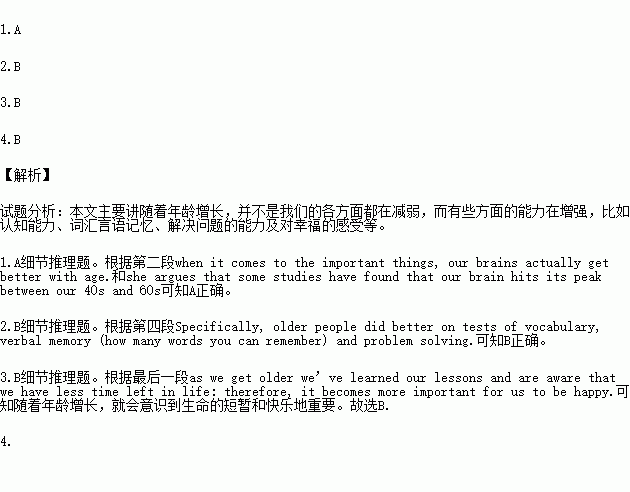题目内容
Ever walked to the shops only to find, once there, you’ve completely forgotten what you went for? Or struggled to remember the name of an old friend? For years we’ve accepted that a forgetful brain is as much a part of aging as wrinkles and gray hair. But now a new book suggests that we’ve got it all wrong.
According to The Secret Life of the Grown-up Brain, by science writer Barbara Strauch, when it comes to the important things, our brains actually get better with age. In fact, she argues that some studies have found that our brain hits its peak between our 40s and 60s — much later than previously thought.
Furthermore, rather than losing many brain cells as we age, we keep them, and even produce new ones well into middle age. For years it’s been assumed that brain, much like the body, declines with age. But the longest, largest study into what happens to people as they age suggests otherwise.
This continuing research has followed 6,000 people since 1956, testing them every seven years. It has found that on average, participants performed better on cognitive (认知的) tests in their 40s and 50s than they had done in their 20s. Specifically, older people did better on tests of vocabulary, verbal memory (how many words you can remember) and problem solving. Where they performed less well was number ability and perceptual speed — how fast you can push a button when ordered. However, with more complex tasks such as problem-solving and language, we are at our best at middle age and beyond. In short, researchers are now coming up with scientific proof that we do get wiser with age.
Neuroscientists are also finding that we are happier with aging. A recent US study found older people were much better at controlling and balancing their emotions. It is thought that when we’re younger we need to focus more on the negative aspects of life in order to learn about the possible dangers in the world, but as we get older we’ve learned our lessons and are aware that we have less time left in life: therefore, it becomes more important for us to be happy.
1.Barbara Strauch probably agrees that ______.
A. people’s brains work best between their 40s and 60s
B. the young are better at handling important things
C. aging leads to the decline of the function of the brain
D. wrinkles and gray hair are the only symbols of aging
2.The continuing research has found older people perform better on ______.
A. perceptual speed B. vocabulary tests
C. number ability D. body balance
3.People are happier with aging because ______.
A. they know how to share feelings
B. they learn to value the time left
C. they cannot focus on negative aspects
D. they do not realize the possible dangers
4.What is the main idea of the passage?
A. People get happier with age.
B. People get more self-aware with age.
C. People get wiser with age.
D. People get more forgetful with age.
 精英口算卡系列答案
精英口算卡系列答案书面表达
某英文网站正在开展关于填报志愿时首先考虑专业还是学校的讨论。请你根据下面所给的要点提示,用英语写一篇短文,描述学生中存在的两种看法,并谈谈你自己的看法,将此文在该网站的BBS上发表。
观点 | 理由 | |
1 | 首先选择专业 | 1. 可以学习自己感兴趣的东西;2.便于将来从事自己喜爱的工作 |
2 | 首先选择大学 | 1.学习环境对人的成长很重要;2.名牌大学的毕业生在求职时常会受到青睐。 |
3 | 你的看法(内容由考生自己拟定) | |
注意:1. 词数:100左右。开头已为你写好,不计入总词数; 2. 内容可适当发挥,注意行文连贯。
Every student will be faced with the question after he passes the college entrance examinations: Should we choose a good major or a good university first?
_________________________________________________________________________________
_________________________________________________________________________________
_________________________________________________________________________________
_________________________________________________________________________________
_________________________________________________________________________________
_________________________________________________________________________________


 ), 并在其下面写出改加的词。
), 并在其下面写出改加的词。 persuaded his employer to buy the New Lanark mill in Scotland.
persuaded his employer to buy the New Lanark mill in Scotland. 1816 he opened the first free primary school in Britain.
1816 he opened the first free primary school in Britain.